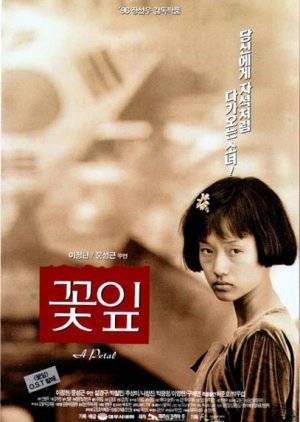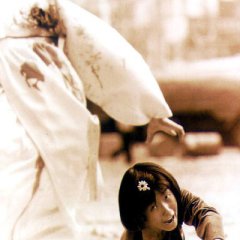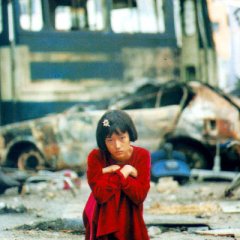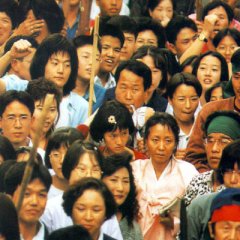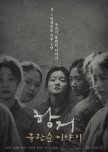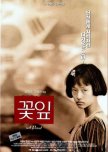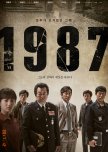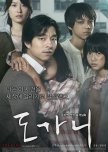The film tells the story of a girl who was caught up in the 1980 Gwangju uprising at the age of 15, and its effect on her life in later years. A dramatic and powerfully moving tale about the effects of post traumatic stress disorder. Edit Translation
- English
- magyar / magyar nyelv
- dansk
- Norsk
- Native Title: 꽃잎
- Also Known As: Kkonnip
- Screenwriter & Director: Jang Sun Woo
- Screenwriter: Jang Moon Il
- Genres: Historical, Psychological, Life
Cast & Credits
- Lee Jung HyunThe GirlMain Role
- Moon Sung KeunJangMain Role
- Sul Kyung Gu[Us]Support Role
- Park Cheol Min[Us]Support Role
- Chu Sang Mi[Us]Support Role
- Lee Young Ran[Mother]Support Role
Reviews

Her story is gutwrenchingly tragic and I was disturbed more about her life after the uprising than the uprising itself. There are at least three semi-graphic rape scenes and a horrible account of more sexual assault done to her by a variety of people. None of this was mentioned in the synopsis at all, so I had no idea that it would be in the movie at all. I do not recommend this movie for the fainthearted, the easily offended, or pretty much anyone but the most stoic viewer. Definitely not for younger viewers at all. I am an adult, and one who is not that easily disturbed and I still found this movie disturbing. That being said, I can still see why this movie won so many awards. It is deeply serious and brutally shows the effects of May 18th. It also shows the darker side of human nature.
Was this review helpful to you?

This review may contain spoilers
Relentless, almost radical in its puristic, rigorous realism. Not pleasant, yet haunting.
“A Petal” is heavy fare. Momentous. Crass. Intense. Disturbing. Yet deeply symbolic, too.Haunting.
It grabs the audience by the hand with a beautiful, harmless (South Korean) earworm from the 1970s and mercilessly drags us into the mentally disturbed reality of a 15-year-old girl who is emotionally trapped in the events of a historically bloody day in Gwangju in May 1980. She has been reliving the painful, unbearable, incomprehensible, unfathomable events over and over again since then. Desperately searching for her older brother to tell him everything she has experienced and suffered, and still cannot understand. But he has long since passed away.
“A Petal” is, for all those who know nothing about the Gwangju Massacre, a strikingly vivid, touching cinematic document of post-traumatic stress disorder. As mentioned, the KMovie with its particular combination of color, repeated flashbacks in black and white and animated dream sequences emotionally pulls us into this merciless inner world and makes us feel it.
But “A Petal” is also a historical milestone in South Korean cinema. Here, in a shockingly realistic manner the Gwangju Massacre was for the first time portrayed in film as a symbol of the suppression of the democracy movement in the country. (End of May 1980 in Gwangju the military was sent against demonstrating civilians, brutally tortured innocent people and killed probably up to 2.300 of them. Nobody could get in or out of the city, with telephones lines being shut down, too.)
The 15-year-old girl, innocent and clueless as she was, and now battered, kicked, helplessly trapped in her trauma, misunderstood, and sexually abused, personifies the nation that is still (even 16 years later) at the mercy of the trauma of Gwangju. A nation that does not quite know what to do with it. That has not yet processed it. That had no chance to do so.
The encounters of the girl on her erratic journey through the province of Jeollanam-do, especially the lone man she finally imposes herself on, represents all those who did not experience May 1980 in Gwangju and have never really learned what happened there, or even that anything happened at all. The dictatorial regime ensured widespread silence.
The girl is the personified, living testimony to the great sacrifices of the South Korean democracy movement. The man, rough and abusive, in the daily mire of his dreary life, embodies the still inexperienced, sluggish mass of the people, who in terms of the new opportunities and freedoms of democracy is however still trapped in the old, violence-dominated, dictatorial structures. These two, the girl and the man, are concrete, however nameless symbols of society at the beginning of the still very young democracy in the country, in the early 1990s. The brother's friends, persistently but laboriously searching for the 15-year-old, stand for the necessary reckoning and conscious processing, for perception, witnessing, revealing and communication of ´us´, so that the still open wounds are no longer ignored and suppressed, but given attention, cared for, and thus may perhaps eventually heal over time. In order to create space for new experiences.
Actually, at the time of the massacre in Gwangju, Director Jang Sun-woo himself was imprisoned for his activities in the student democracy movement. It was then that he decided to make politically critical movies in the future. However, this future took another 15 years to materialize. It was not until the 1990s that the democracy movement in the country began to bear its first fruits. It was not until 1996 that it was possible to bring the incredible events of May 1980 to the public's attention.
The film “A Petal” is relentless, almost radical in its puristic, rigorous realism. Especially Lee Jung-hyun, who made her acting debut here, had to go from 0 to 100 to connect internally with this mentally disturbed protagonist and thus convincingly portray her character. Impressive, too: Moon Sung-keun. The intensity of “A Petal” is breathtaking. Not pleasant, tough. Haunting.
Mission succeeded...
There were several well-deserved (and international) awards. However, some cinema-goers may have left the cinema early. It is a quite demanding KMovie. We are supposed to engage with the disturbing psychological situation of the girl. With what led to her becoming like this. And with how her mostly ignorant environment initially reacting helplessly and violently, to her apparent weirdness. Yet it is at last also a relieve to see, how a caring relationship eventually may develop even from the initially dismissive and unrestrainedly abusive one.
The title is the title of a song that the girl likes and sings, back then, before it all happened.
The song “A Petal” tells of how the petals fall, the memory of it is hard to bear, because there was a farewell. However, they didn´t talk back then... and again and again, when the petals fall, there is this memory of this abrupt farewell, which is hard to bear...
The theme of this song becomes the theme of this girl... who is desperately searching for her brother to tell him what happened, what she had to experience, what she still cannot grasp and does not understand.
Was this review helpful to you?

